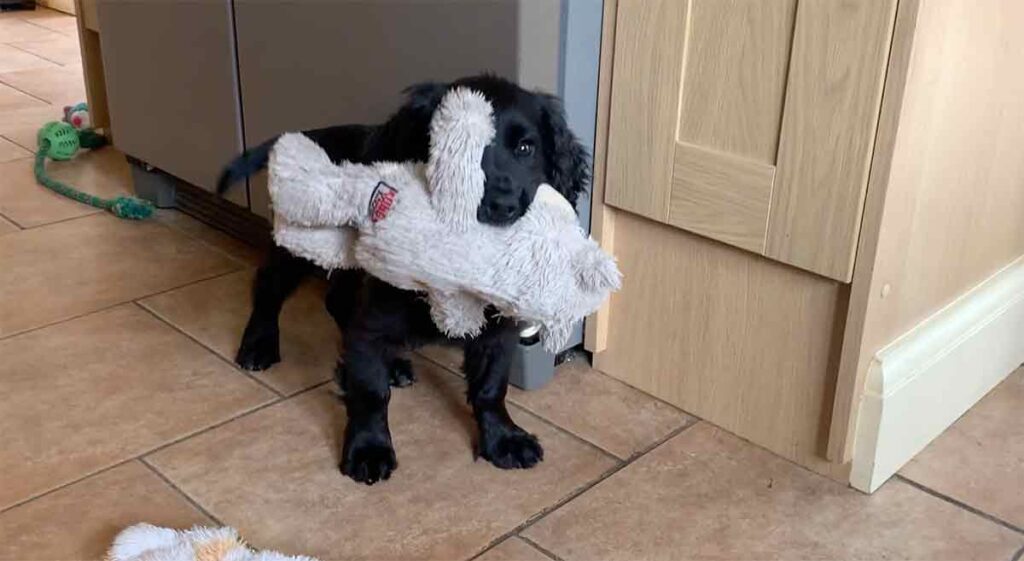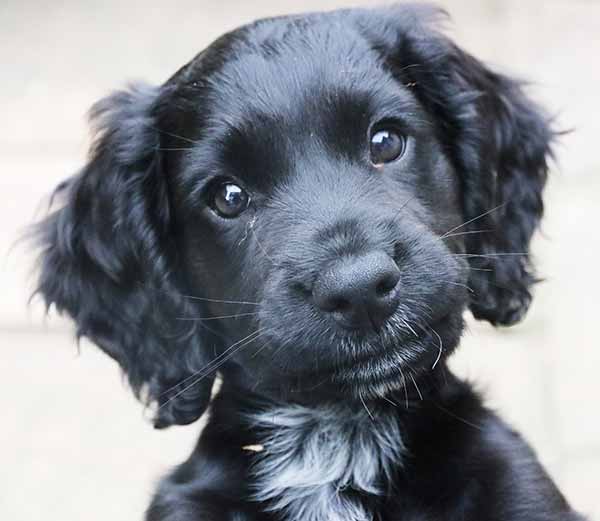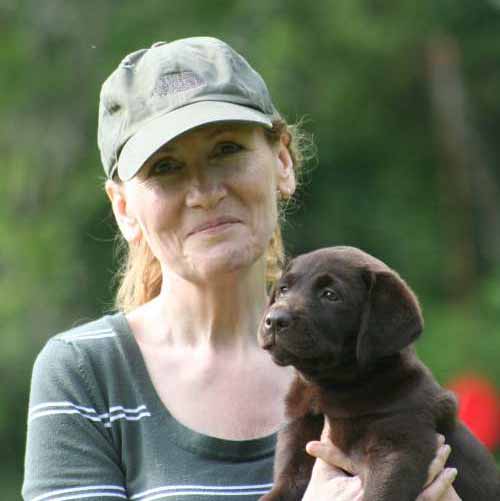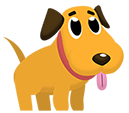I want to talk a bit about biting today because biting puppies can test your patience to the limits, and because it’s one of those aspects of puppy behavior that can come as a big shock.

New puppy parents are often initially lulled into a false sense of security on the biting front when they bring home an adorable 8 week old puppy. And there may be very little in the way of biting for the first few days.
In fact, biting often doesn’t start in earnest until the puppy has settled in and recovered from their homesickness during the second week. And tends to peak at around three months old.
A five step plan
I sometimes talk to people with 12-14 week old puppies that are at their wit’s end. Short of sleep, emotional, and even questioning whether or not they want to keep their pup. And their feeling that biting is out of control is often a big part of that.
Some have tried saying NO BITE, pinning puppies down, crating, holding puppies muzzle shut, biting back, smacking and so on. They didn’t want this to happen, and they want to be kind to their puppy.
If you recognize some of yourself in the above, don’t panic. You are not a bad person, and you are not alone. Follow my easy five step plan to rediscover your sweet puppy and this difficult phase will soon be a distant memory!
#1:The first step is to stop with all the force and shouting
Puppies don’t understand the word NO, squealing doesn’t stop all puppies from biting and encourages some to bite harder.
The problem with using force whether it’s pushing or pulling the puppy around, is that this is how puppies play. So it encourages the puppy to continue with rough play and become even rougher.

Worse still, if you are successful in frightening the puppy sufficiently to stop it from play biting altogether you risk triggering a much worse type of biting – one based on fear aggression. So that is definitely a route you should avoid at all costs.
#2: The second step is to recognize that your puppy is completely normal
Rough, hard biting is part of normal puppy play. Loud aggressive sounding growling is also part of normal puppy play.
We’re talking snarling and snapping here. Not cute little puppy sounds.
This is how puppies play.
It is extremely unlikely that your puppy is aggressive, which is often the main concern that new puppy parents have.
Aggression in dogs is usually caused by fear, and fearful puppies don’t grab at your clothes and nip at your fingers, they hide under your couch or in another dark, safe place.
#3: The third step is to recognize that you are having a tough time
This is a tough time, for any new puppy parent. Even experienced ones.
Sleep deprivation and having your life turned completely upside down is extremely hard for anyone to deal with.
For new puppy parents there is often a complete mismatch between what is happening to you and what you expected. You may even feel quite tricked!
If you have other problems in your life, as most of us do, then the problems will seem magnified. And it’s very common for puppy parents to go through a time of sadness at the loss of their old life, before the puppy arrived, and before they have adjusted to their new one.
So be kind to yourself, you are doing okay!
#4: The fourth step is to recognize that you will get through this
The vast majority of puppy parents get through these early weeks a little wiser and relatively unscathed.
Not only that but they have no regrets and would do it all again.
They might change a few things, but they love their dog to bits and thoroughly enjoy him or her being a part of their lives.
So you need to look ahead and focus on the future. Think about how different things will be in a month or so. And maybe plan a treat for yourself, for around that time. A reward for all your puppy parenting efforts.
Remember, you will get through this, there are just a few things you may need to change. Let’s look at the things people do that make puppies even more bitey so that you can avoid them!
#5: The fifth step is to change the way you handle your puppy
You can’t avoid the bitey stage altogether.
But you can reduce the intensity, frequency and duration of biting and hyper episodes that are so wearing to deal with.
Biting and growling are worse when a puppy is excited, or when humans engage the puppy in physical play. Many new puppy parents expect to be able to play with a puppy with their hands. Many people roll a small puppy on its back and rub its cute squidgy tummy with their fingers.
If your puppy is biting a lot, you’ll need to stop these kinds of games.
Here are some things that people do that can increase biting in many puppies
- Ruffling fur, ear etc with hands
- Rubbing tummies with hands
- Pushing
- Pulling
- Growling back at a puppy
- Squealing when a puppy bites
These and other similar behaviours all encourage puppies to bite and growl
The best way to survive this stage is to reinforce calm behavior, and to avoid over-exciting the puppy. Here are some techniques that will help you.
Reinforcing calm
It’s important not to focus solely on stopping unwanted behaviors. We also need to help puppies learn great ways to behave. Ways that help keep them calm and relaxed.
Here are some ways that you can reinforce calm and appropriate behaviors in your puppy.
- Place a treat between your puppy’s paws when they are laying down quietly.
- Teach your puppy how to behave around treats so that you can spend time together training.
- Teach your puppy to look at your face.
- Teach your puppy to touch your hand.
Spend your time together reinforcing other calm behaviours such as lying in a bed or on a mat. You’ll find tips on getting great behaviors going in this article: First Steps In Dog Training
When a puppy bites at your skin or clothing, offer an alternative item to chew. Separate your puppy for a few minutes if they start biting hard or get excited.
Separating your puppy
If your puppy is getting over excited step over a baby gate or put your puppy on the other side of a baby gate.
Or leave the room for a few moments, or crate the puppy for a few minutes. These strategies all give the puppy a chance to calm themselves.
You may need to do this repeatedly initially, but if you are consistent, your puppy will learn. Don’t be tempted to shut puppies away for long, or leave them alone for long. These little separations should be very brief.
Avoiding over-exciting your puppy
Most people have a friend or family member that enjoys teasing puppies. Don’t allow people to tease and wind up your puppy.
Stop any games where the puppy seems to be losing control of himself or becoming a bit hysterical.
Then give the puppy chance to calm down in a quiet room or crate for a few minutes.
More tips – these really help
Don’t wear clothing that flaps and trails when you have a small puppy. Don’t wear fluffy slippers or walk around barefoot with a ten week old puppy in the house. These encourage biting.
Don’t wear precious or valuable clothes with a very young puppy in the house because there will be chewing and damage.
Put the puppy out in the garden or an outdoor puppy playpen with no attention if he gets the zoomies.
The zoomies are normal, in fact some dogs have them all their lives, but there is no point trying to calm or pet a puppy mid zoom. Nor any reason why your furniture should suffer!
Biting and overexcitement go together
Biting and an excited puppy go hand in hand.
The more you can work on keeping your puppy calm, the easier it will be to get through this stage with your sanity intact!
Hang on in there, it gets better soon!
The final step is to share and support one another
Tell us how you are getting on, share your worries and concerns with other puppy parents in our Facebook support group. Puppy parents tell us that this really helps.
If you are able, come back and help others when you are through the worst. This kind of shared experience is so valuable and reassuring.
That’s what the support group is for and it is puppy parents like you that make the group such a great resource. Hope to see you there!

Free Training Tips
Get Pippa's free dog training tips delivered to your inbox

 Will My Dog Grow Out Of Bad Behavior? (Spoiler – It Depends!)
Will My Dog Grow Out Of Bad Behavior? (Spoiler – It Depends!)
I feel this could be written for me! I have a 4 month old border collie who is an absolute darling, he’s learnt his name and to sit, wait and high five, I’ve also gotten him to learn to walk on a lead, still pulling me but I’ll get there hopefully. However…. Every night at around 6pm the zoomies start for about 2 hours and he constantly attacks and bites me, and bites hard, tries to get my fingers and really pulls back I’ve bled many a time. I’ve tried time out in a safe space and he’s a little better, but our 18 months old granddaughter also lives with us and he always jumps up on her, he licks her but his paws scratch her arms and legs and I don’t know what to do, please help any advice would be appreciated
Hi Tammy. This is a difficult age isn’t it. It may be a tweak in pup’s daily routine would help with the evening zoomies – if you’d like to pop over to the Dogsnet Training group we can take a look at your day with you there and suggest some changes :). In the meantime the best tactic with the little one is to keep barriers between her and pup at all times, unless an adult is diving hands-on supervision of an interaction with pup at a time when he is calm. Puppies just can’t understand how delicate and vulnerable toddlers are. Hang on in there – this will get easier as they both get older!
~Sammie
This article seems like it was written for me. Oh my gosh it is exactly how I am feeling. Thank you so much for this information and encouragement. I have been sad thinking I may be too old (73) but I love dogs so much and had to put my Maddie down due to illness. I just can’t live without a dog. I feel much better now and know what I have to do. Now if she would just poop outside I would be ecstatic!
Thank you for your lovely feedback – we’re so pleased Pippa’s article helped you feel better.
Take a look at this article for some help with the potty training! 🙂
My 10 week old Shihpoo/Maltese puppy is a biting/chewing nightmare. It is extremely hard to deal with. I appreciate you saying biting peaks at 3 months and starts disappearing.
Thank you for this info. I know my dog is not the only one and not possessed by the devil.
Thank you.
This is a hard age, but hang on in there and you will get through it! Don’t forget to pop in to our Dogsnet Support Group on Facebook if you’d like to connect with other puppy owners, for some support. We’d love to see you there 🙂